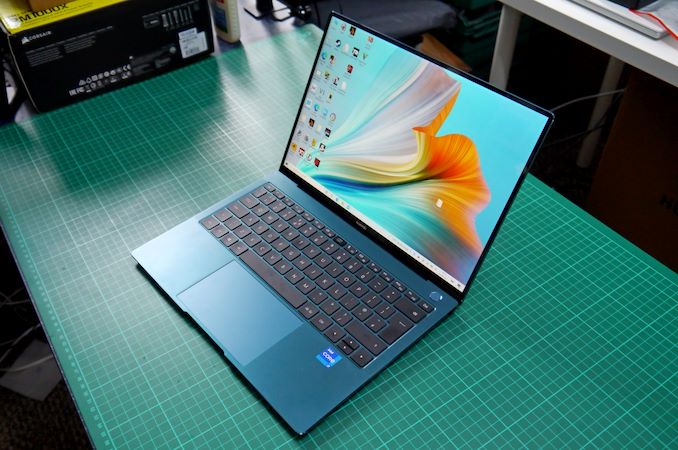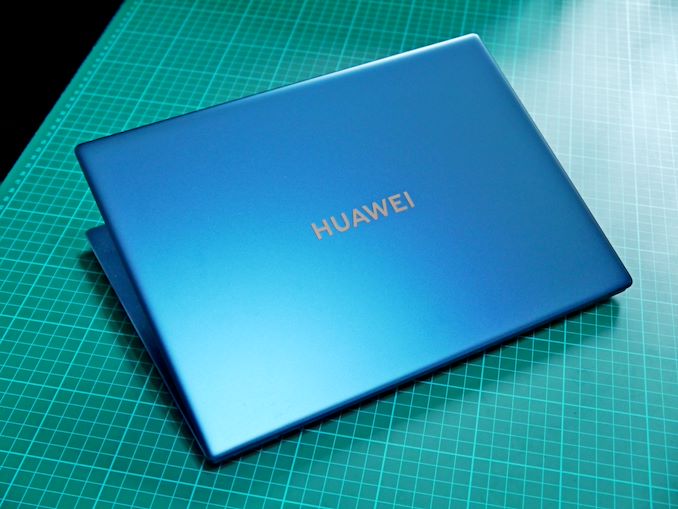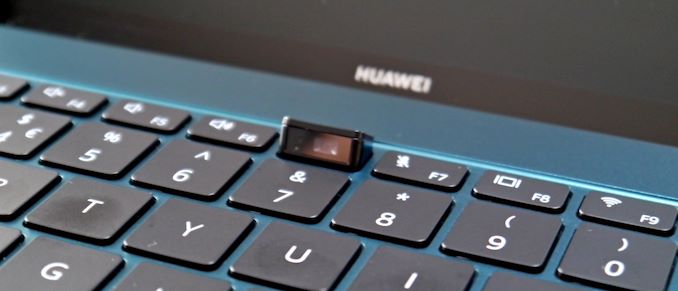Huawei MateBook X Pro (2021) Review: A Sleek and Vibrant Notebook
by Dr. Ian Cutress on September 28, 2021 9:00 AM EST- Posted in
- Notebooks
- Intel
- Huawei
- Laptops
- Matebook X Pro
- Tiger Lake
Final Words
The laptop/notebook market is very competitive. The whole range of prices for laptops, from $200 to $2000+, involve a series of tradeoffs for performance, battery, versatility, customization, portability, and everything in between. It goes beyond simply putting a processor and a display into a chassis, as the form of the chassis will define the cooling, which in turn defines the power available to what is inside. Not only this, but companies in the laptop supply chain might offer discounts for buying multiple modules, or committing to stock, or have a variety of certifications which if the device can achieve, there might be co-marketing budgets applied. Not only this, but it also should look good – probably. Everything from the $200 Chromebooks, to the $1400 mid-range portables, to $2500 space-age sub 1.5kg 17-inch notebooks, and to the desktop replacements, all have to balance the cost and design for performance and appeal.
Huawei may only be a young entrant into the laptop OEM market, but in its fourth year it does have a good foothold in a number of these areas. Despite issues with the entity list, it can still buy processors from Intel, licenses from Microsoft, and offer machines into the global market with a design flair traditionally made for its smartphones. Ever since the first MateBook E 2-in-1, Huawei has applied a superior aesthetic to its devices, however what it has had to work on is usability.
The MateBook X Pro 2021 (13.9-inch) is one of the premium laptop offerings from Huawei. Our model features the latest Intel 11th Generation Core i7-1165G7 quad-core processor, a thin-bezel 3000x2000 resolution display, 16 GB of LPDDR4X memory, a 1 TB Samsung NVMe SSD, Wi-Fi 6, and a 56 Watt-hour battery all in a 1.33 kg (2.9 lb) aluminium unibody chassis, 14.6 mm (0.57 inches) at its thickest point.
This laptop is designed to sit square opposite equivalent MacBook Pro 13-inch models, with a larger resolution, more default memory, more default storage, while being both lighter and thinner, for about the same price (give or take $100). The equivalent storage/memory version from Apple would be +$800, however the M1-based MacBook Pro wins on battery life and performance. There are also a large number of competitive Windows-based machines at this price point as well.
In isolation, Huawei does a number of things right. The portability and feel is good, the trackpad and keyboard are certainly better than average to use, and the power button as a physically separate key design with a built-in fingerprint is a big plus. The display is big, and vibrant, and the device has both Type-C and Type-A ports, which are a must.
However it does get a few things wrong – that webcam placement has to disappear at some point. It’s somewhere between not-present and useless. If Huawei doesn’t want to put it in the display where it traditionally sits, it needs to think of a solution. Beyond that, the battery life isn’t really as great as I thought it would be. We achieved just under 9 hours for light work – either video playback or web browsing – when really I would be expecting 13+. We’ve seen similar 10th Gen and 11th Gen Intel processors get 13-16 hours, although those have lower resolution (1080p) displays. The performance ultimately isn't that stellar, compared to others in this market, perhaps due to the design limitations and 15 W limit in order to get the display and chasis of this caliber. This is some of the tradeoffs that laptop manufacturers have to make.
The Huawei MateBook X Pro 2021, with 16GB/1TB, is available in the UK for £1300 (Space Grey) or £1400 (Emerald Green) with a current deal for £150 rebate as well as a choice between a free Huawei Monitor, Watch GT2, or Matepad T10, all worth ~£200.














84 Comments
View All Comments
Oliveira_Salazar - Tuesday, September 28, 2021 - link
Very poor review.No direct comparisons with the latest MacBook Air. No M1 mention at all.
It would be extremely easy to include the MacBook Air and/or Pro in a lot if not most of these benchmarks/comparisons. Even the Intel version.
The MBA is the default laptop of this category and everything should be considered against it. Let's not even mention how inspired Huawei is by MBP's designs. You mention that they are trying to place this in a segment where the Macs are their main competition, but don't feature them in any testing at all?
It's pathetic.
This machine is absolutely obliterated performance wise in all metrics. Specially while on battery.
You only make a poor argument that "an equivalent specced Mac is +800$", but "wins on battery life and performance". Is that fair? Is that the whole relevant story? Wouldn't a competent review also include something like "a 500$ to sometimes 600$ cheaper, completely silent MacBook Air beats this in almost all performance metrics and usage scenarios, sometimes by a lot, and wins heavily in battery life too, but only has 8GB of RAM and 256GB of storage, while a version with the same RAM and Storage costs only 100 to 200$ more"
Why isn't there detailed performance testing while on battery power? These are thin and light machines for a reason. It's incredibly low effort to default to a pathetic "browsing test" and "200 nit video playback" to measure battery life.
People use these devices on the road. The default state of all laptops is unplugged. All performance testing should be done by default while on battery, and a separate one while plugged in, all conditions the same, and conclusions should be made.
Unless someone really really needs windows, these laptops should never be recommended at this point. They have are horrific value compared to what an Air offers while on battery.
But people that only read this review wouldn't know.
dontlistentome - Tuesday, September 28, 2021 - link
I'll bite.The MBA is the default laptop of this category - no, it really isn't. If you need to fit into a Windows infrastructure, the default will likely have a HP, Dell or Thinkpad logo on it. Macs are *horrible* to use in a corporate environment. Given their input into the protocol the Thunderbolt implementation is borked (mostly round MST tagging for multiple displays). But then again the MBA can only drive one external panel.
Your price comparisons are **way** out. A Macbook with 16gb/512GB is not $200 more, it is $400 more minimum - the closest comparitor to this is $1450 - $50 less and that's before discounts which don't exist on Apple.
My team has 50+ laptops - mostly Thinkpad X1 Carbon of various gens, some Macs for the off balls. They are used 95% at a desk with power. That's the PCs and Macs (including the M1 Macbooks).
Go off and have a cuddle with your Macbook and feel great about what a genius you are. Meanwhile the rest of the world is still Windows.
lemurbutton - Tuesday, September 28, 2021 - link
I'll bite.The Macbook Air M1 is significantly better than this laptop, and any Windows laptop in its class. Windows itself is less advanced than MacOS. The only thing Windows has that the Mac doesn't is AAA games. That's it. The Mac does everything else better.
Your Thinkpad X1 Carbon sucks compared to M1 Macs.
They should fire you for not buying M1 Macs.
dontlistentome - Tuesday, September 28, 2021 - link
I have both (X1 Gen 9 / MBA M1). Do you?dnanatech - Wednesday, September 29, 2021 - link
I have/had all of those (i7 X1gen6, i7 Matebook XP 2018, M1 MBA), and i7 Latitude 7390.The Mac is significantly better than all 3. X1 has unreliable fingerprint reader, a dim screen, weirdo Fn vs Cntrl key layout (i know it can be re-mapped in BIOS), overheats like a furnace, etc.
Worst of all, all the Windows machine have various battery-performance issues (sleep/hibernate drain, pickiness on chargers, low charging rate, etc), some of which is due to the common OS layer, and some of which is hardware unique to each machine.
It's not limited to these 4 device samples and generation. This goes back many generations to other machines I've had both on Windows side and Apple. Some of the Windows machine are sanitized as corporate-managed devices, and the others I've kept barebone and lean. After a long enough, I have to assume it's the nature of Windows laptops to have battery-related issues.
gescom - Tuesday, September 28, 2021 - link
"Thinkpad X1 Carbon sucks compared to M1 Macs"Please do elaborate.
mmrezaie - Tuesday, September 28, 2021 - link
I had to buy Macbook pro M1, because I needed a laptop and I couldn't find X1 anywhere and lenovo support told me it may take a very long time. M1 laptops are amazing, but X1 is something else. I will still if I had a choice would go X1, just for the keyboard and Linux.Samus - Wednesday, September 29, 2021 - link
My wife had a MBP M1 and returned it after a week. Running legacy applications was like using a Core 2 Duo-era Macbook. And MOST PROGRAMS ARE LEGACY PROGRAMS. I don't think people realize even ADOBE hasn't ported even half their creative suite to M1. And many of the legacy apps have known issues. For example, you can't use Adobe Forms for Acrobat. Literally, the program CANNOT RUN on M1.https://helpx.adobe.com/download-install/kb/apple-...
So unless you exclusively use Apple software and treat the machine like a toy for Safari, Mail and Photos, it's unreliable and the power is wasted.
She went back to using her 2018 MBP and fixed the keyboard that was the problem anyway, and will wait a year or two before revisiting a new Macbook.
mmrezaie - Wednesday, September 29, 2021 - link
Well, I do a lot of data science development and also system software developments. M1 is very good. My grip is with macOS. There are so many quirks I want to do which I cannot, but I could in Linux. On the other hand, macOS has much better support on desktop side compared to Linux.If I could have M1 arm on Linux, ooh that would be one sexy long battery and capable enough muchine.
star-affinity - Saturday, October 2, 2021 - link
”My grip is with macOS. There are so many quirks I want to do which I cannot, but I could in Linux.”Could you mention a few examples of those quriks? Just curios...